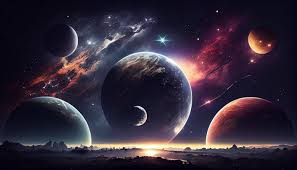The Concept of the Infinite Universe
One of the most intriguing ideas in cosmology is the concept of an infinite universe. The notion that the universe might be limitless in size has captivated scientists and philosophers for centuries.
In an infinite universe, there would be no boundaries or edges to space. Stars, galaxies, and other cosmic structures would extend endlessly in all directions, with no final frontier to reach.
This idea challenges our traditional understanding of the universe as a finite entity with a specific size and shape. It raises profound questions about the nature of reality and our place within it.
Some theories suggest that if the universe is infinite, then there could be an infinite number of parallel universes or alternate realities coexisting alongside our own. This idea of a multiverse adds another layer of complexity to our understanding of existence.
While the concept of an infinite universe may seem mind-boggling, it offers a glimpse into the vastness and mystery of the cosmos. It reminds us that there is still so much we have yet to discover and understand about the nature of space and time.
Whether the universe is truly infinite or not remains a topic of ongoing debate and research among scientists. As we continue to explore the cosmos and push the boundaries of our knowledge, perhaps one day we will unlock the secrets of an infinitely expanding universe.
Exploring the Boundless: Six Fascinating Insights into the Infinite Universe
- The concept of an infinite universe suggests that it extends endlessly in all directions.
- In an infinite universe, there could be an infinite number of galaxies, stars, and planets.
- The idea of infinity in the universe challenges our understanding of space and time.
- Some theories propose that our observable universe is just a small part of a much larger infinite cosmos.
- An infinite universe raises questions about the possibility of parallel universes or alternate realities.
- Exploring the implications of an infinite universe can inspire curiosity and wonder about the vastness of existence.
The concept of an infinite universe suggests that it extends endlessly in all directions.
The idea of an infinite universe implies that it stretches boundlessly in every conceivable direction, with no discernible end or boundary in sight. This concept challenges our conventional understanding of the cosmos and invites us to contemplate the vastness and mystery that lie beyond our current comprehension.
In an infinite universe, there could be an infinite number of galaxies, stars, and planets.
In an infinite universe, the possibilities are truly staggering – there could exist an infinite number of galaxies, stars, and planets scattered across the vast expanse of space. The sheer magnitude of such a scenario challenges our understanding of the cosmos and highlights the boundless potential for discovery and exploration that an infinite universe presents.
The idea of infinity in the universe challenges our understanding of space and time.
The concept of infinity within the universe fundamentally challenges our comprehension of space and time. The notion that the cosmos could extend endlessly in all directions raises profound questions about the very nature of reality and existence. It forces us to reconsider our traditional beliefs about the boundaries and limitations of space, as well as the linear progression of time. Embracing the idea of infinity in the universe opens up a realm of possibilities and mysteries that continue to intrigue and inspire scientists and thinkers alike.
Some theories propose that our observable universe is just a small part of a much larger infinite cosmos.
Some theories propose that our observable universe is just a small part of a much larger infinite cosmos. This concept suggests that beyond the boundaries of what we can see and measure lies a vast expanse of space and time that extends infinitely, containing countless galaxies, stars, and unknown phenomena. The idea challenges our perception of the universe’s scale and complexity, hinting at the possibility of a reality far more expansive and mysterious than we can currently comprehend.
An infinite universe raises questions about the possibility of parallel universes or alternate realities.
An infinite universe challenges our perceptions of space and time, prompting contemplation on the intriguing notion of parallel universes or alternate realities. The concept suggests that within the vast expanse of an unlimited cosmos, there could exist countless other realms or dimensions coexisting alongside our own. This idea sparks curiosity about the potential diversity of existence beyond what we can perceive, inviting us to ponder the mysteries and complexities of the universe in a new light.
Exploring the implications of an infinite universe can inspire curiosity and wonder about the vastness of existence.
Exploring the implications of an infinite universe can inspire curiosity and wonder about the vastness of existence. The idea that the cosmos may stretch endlessly in all directions challenges our perceptions of space and time, prompting us to contemplate the mysteries beyond our current understanding. Such contemplation can spark a sense of awe and fascination, encouraging us to delve deeper into the complexities of the universe and ponder our place within its infinite expanse.

No Responses